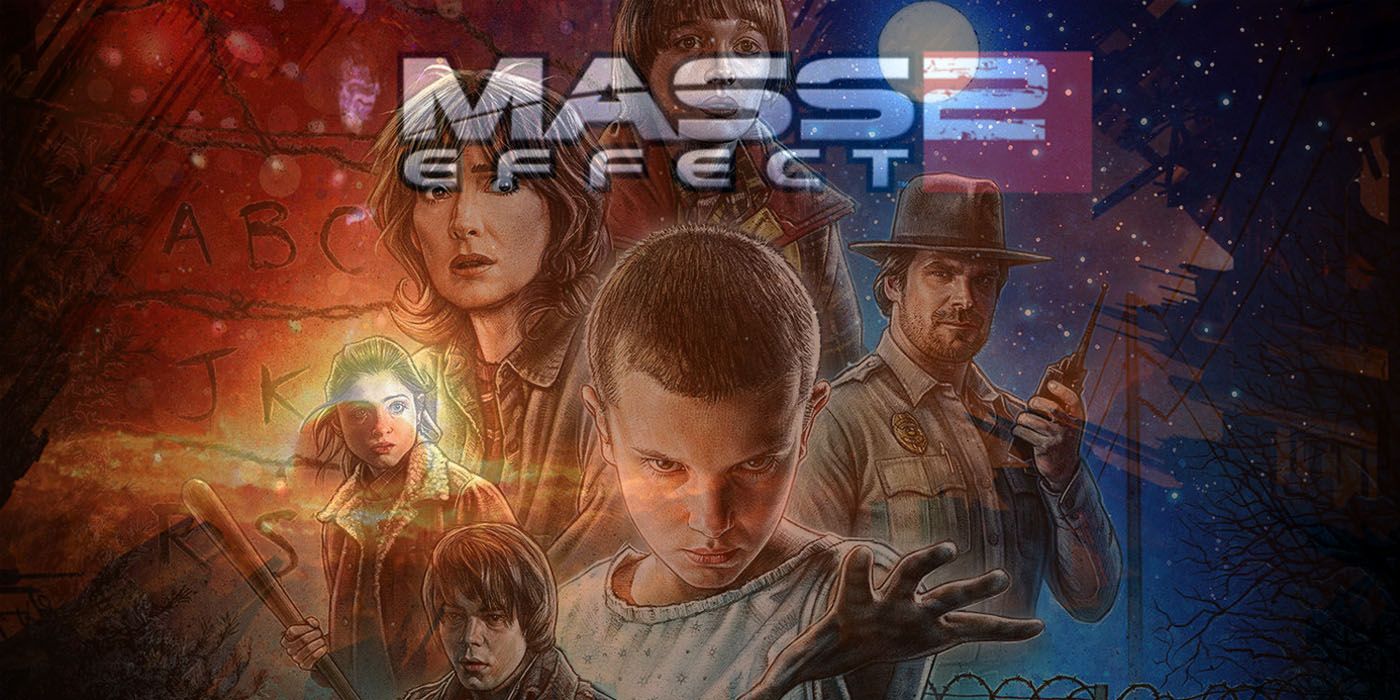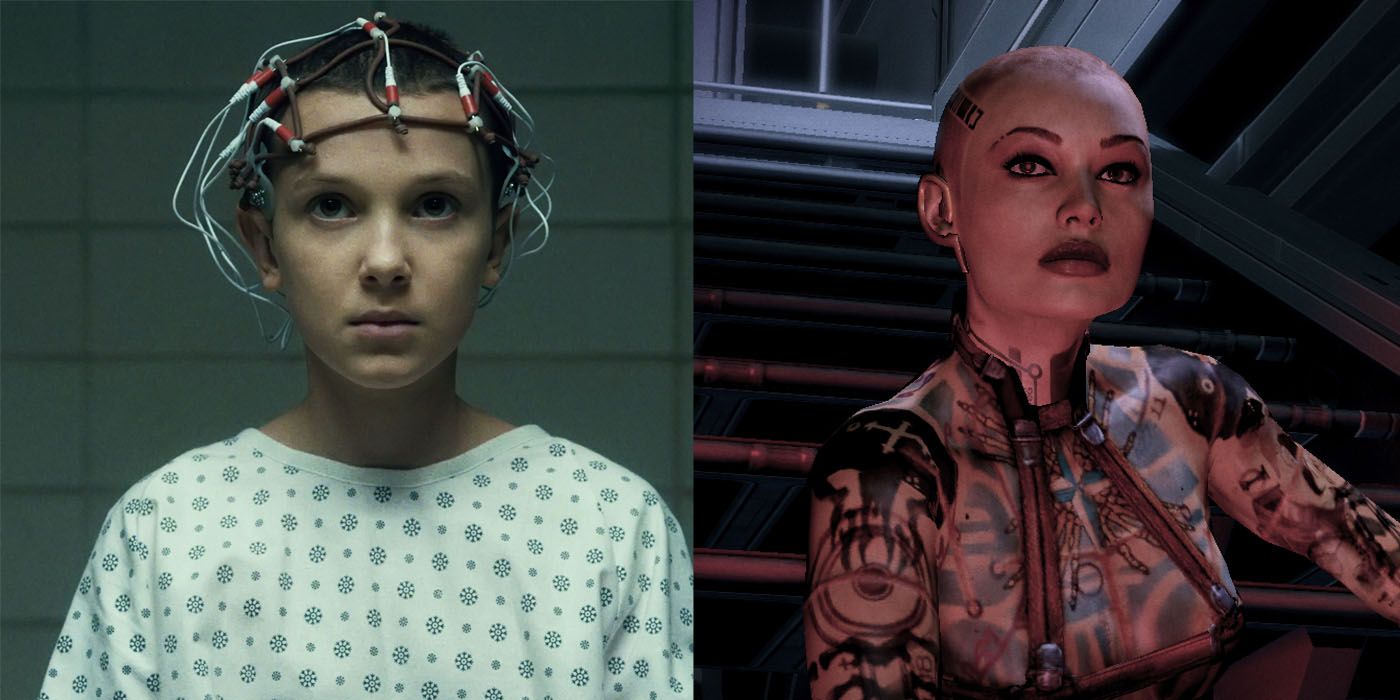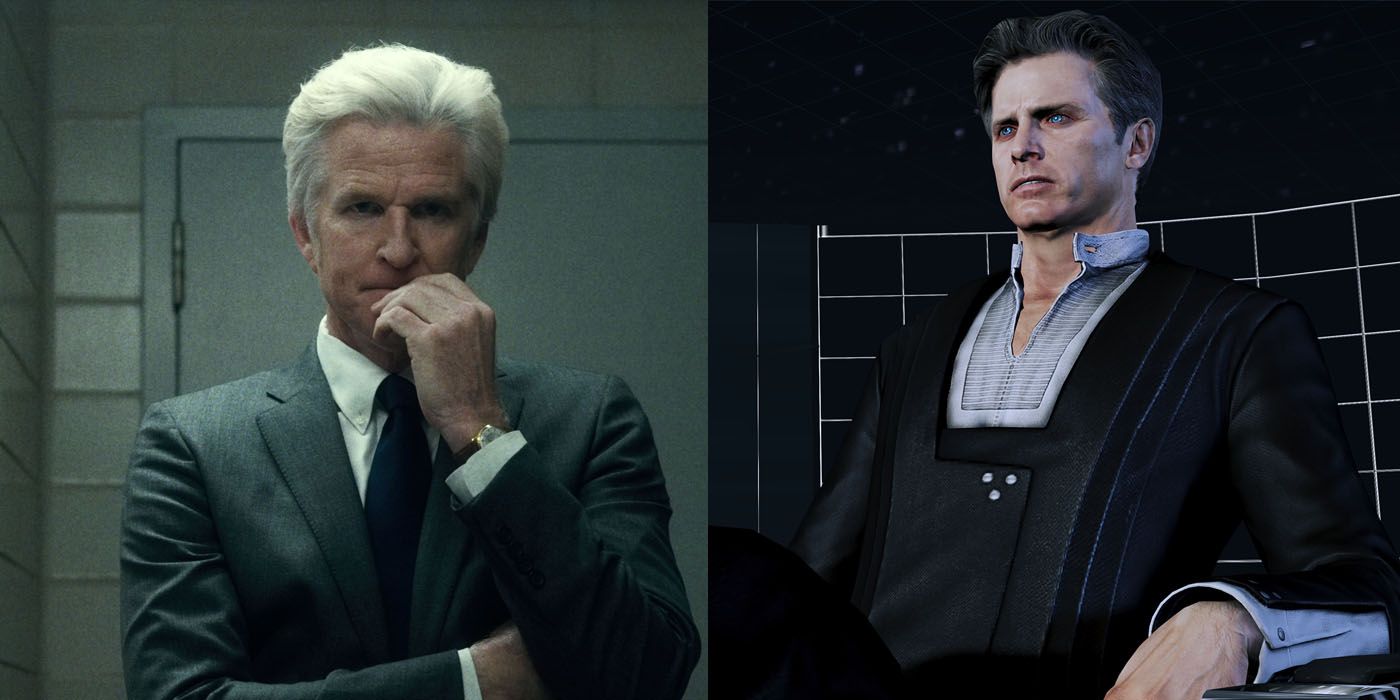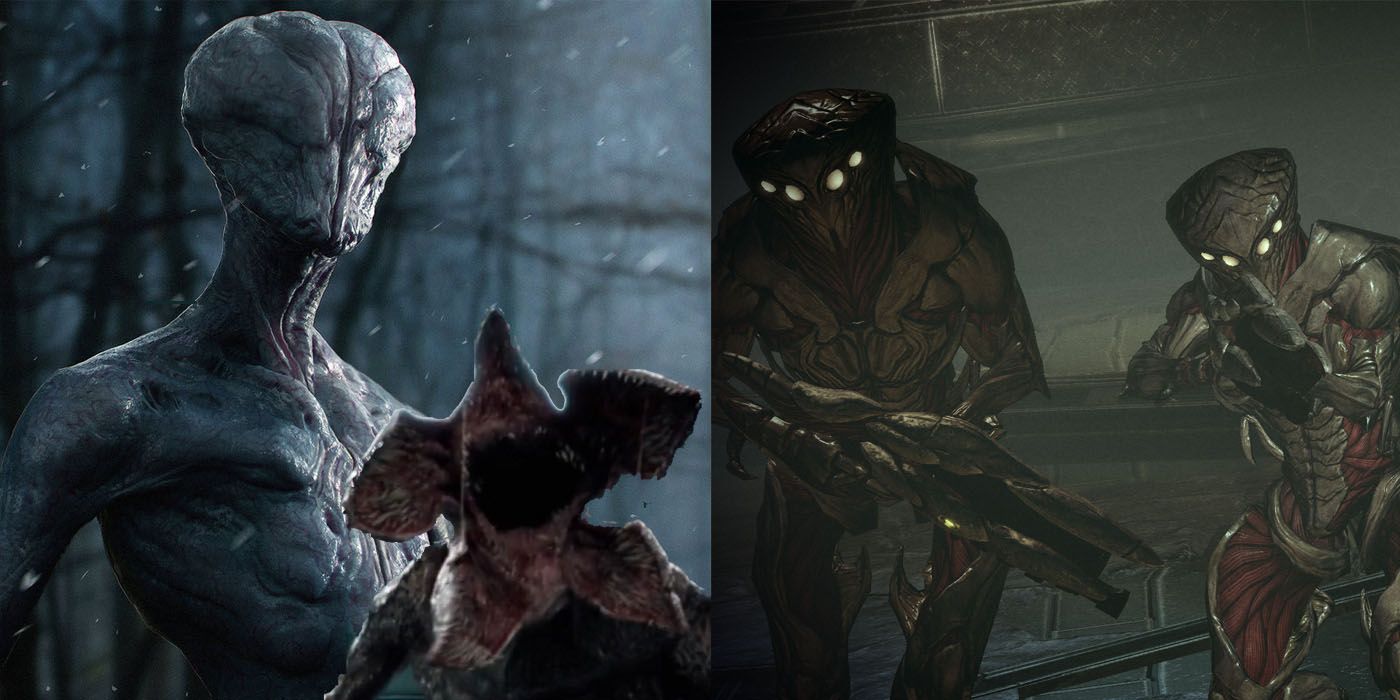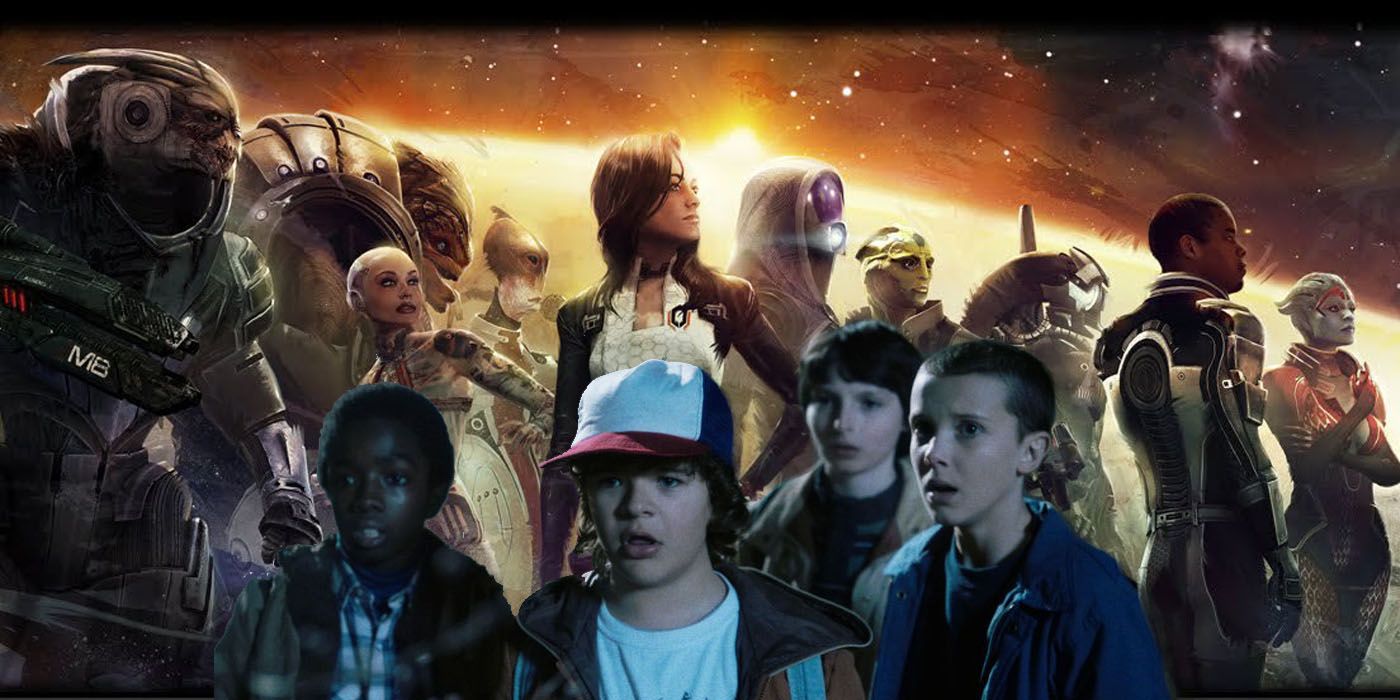Warning: Spoilers ahead for Stranger Things season 1
-
Stranger Things has been a massive success for Netflix, surprising viewers and critics alike. Prior to its mid-July release, buzz about the thriller focused on Winona Ryder's character, Joyce Byers, and not all of it was positive. However, after the overwhelmingly positive reception - thanks in large part to the endearing young actors - Netflix wasted no time in confirming the show for a second season. The series is chock-full of '80s nostalgia with nods to icons of genre film, including Steven Spielberg's deft tones of childhood innocence, Stephen King's creepy psychological horror, and John Carpenter's sci-fi horror monsters.
Another, more recent, property that Stranger Things resembles is the Mass Effect universe, created by video game developer BioWare and kicking off in 2007. The sci-fi RPG franchise started with a bang and built on its success with the release of Mass Effect 2 in 2010. This game was far more character- and story-driven than the first, allowing for up to 12 squad members (including DLCs) in addition to team leader Commander Shepard. It's in the second game that we can draw parallels between Stranger Things and Mass Effect that really feel like much more than just coincidence.
Though this might seem like a stretch, Stranger Things creators Matt and Ross Duffer recently told THR that they are big fans of video games, and included a lot of references to video games in the show (for example, the Upside Down is heavily inspired by the Otherworld of the Silent Hill franchise). With that in mind, let's take a look at some of the strange parallels between Stranger Things and Mass Effect.
Eleven/Subject Zero
Stranger Things viewers meet Eleven while she's on the run from some type of unknown government research facility. As the season progresses, it becomes more and more apparent that Eleven was exploited and honed by a clandestine agency to be used as a weapon controlled by the US government. Though she may be small in stature, Eleven packs a mean punch with her telekinetic abilities. Taken from her mother as a newborn, Eleven doesn't know life outside the facility walls. Eleven appeared to be the most successful child at the Department of Energy facility in Hawkins, but it was her power that grew so strong it literally blew a hole in our dimension.
Similarly, Jack/Subject Zero's backstory involves her being taken from her family and sent to a research facility so a team of scientists could test the limits of her biotic abilities (think supercharged telekinesis). The scientists belong to an organization called Cerberus, which was once a military sanctioned Black Ops branch before it went rogue. In this facility, Jack and children like her are experimented on in the hopes of making a controllable biotic weapon.
With their newfound freedom, both characters have to learn how to interact and work with (and trust) people that actually want to help them instead of using them for their own personal gain. The biggest difference between the two characters is their temperament. Where Eleven is quiet and mouse-like, Jack is a bulldozer mowing down anything in her way and leaving a string of obscenities in her wake, justifying her attitude with the explanation: "Mess with someone's head enough, you can turn a scared little kid into an all-powerful b---h." Given the circumstances of their upbringings, it's not hard to make the connection that had Eleven not gotten out when she had, she could have wound up just as damaged and cynical as Jack. But a great heroine is forged by overcoming a powerful villain.
Dr. Brenner/The Illusive Man
In Stranger Things, the dynamic between Eleven and Dr. Brenner (Matthew Modine) is portrayed as a very dysfunctional father/daughter relationship. Eleven refers to him as Papa, and it's heartbreaking to watch her internal struggle when she doesn't perform to his expectations. Brenner and his clandestine Department of Energy staff (what does that even mean?) are dabbling in the art of mind control, using Eleven as an operative to kill Russians during the Cold War. As Eleven's astral projections get stronger, Brenner's manipulation becomes more heavy handed. Even after she escapes from the lab, Eleven still harbors a soft spot for the doctor that leaves potential for him to return for the second season.
Jack, on the other hand, is a hardened criminal that wants nothing more than to destroy anything remotely related to Cerberus and its head of operations, The Illusive Man. A shady character from the moment he's introduced in Mass Effect 2, The Illusive Man proves to be a mastermind and formidable foe for two games. While he denies any direct involvement or knowledge of the experiments at the Teltin Facility where Jack was held, it becomes glaringly obvious that he has an unprecedented desire for control and will stop at nothing to secure his endgame.
Both the Illusive Man and Dr. Brenner are played by great actors (with Martin Sheen lending his voice to the Illusive Man) and have a wonderful ability to seem omnipresent. They manage to take up residence in the back of the viewer or gamer's mind, leaving us to wonder what they're doing when they aren't on screen. Mass Effect's Illusive Man is verbose, yet cold and unforgiving; while Dr. Brenner's quiet authority is what gives him a ruthless edge. These two leaders who can move mountains to obtain results, never expected their subjects to rise up against them -- which is a costly mistake.
Demogorgon/Collectors
Unleashed first during an intense game of Dungeons & Dragons in Mike's basement, the Demogorgon is an unimaginable creature whose sole purpose is to wreak havoc. But when Eleven accidentally opens a gateway to another dimension, the Department of Energy does its best to contain the situation and fail spectacularly. After Will and Barb, several other townsfolk go missing at the hands of a real monster, but no one seems to believe there's something more sinister at work. At one point, Sheriff Hopper (David Harbour) dismisses Joyce Byers' (Winona Ryder) when he tells her that the worst thing that's ever happened in their small town was when, "an owl attacked Eleanor Gillespie’s head because it thought that her hair was a nest." There is no sense of urgency to reveal the Demogorgon too quickly, and as the suspense builds more characters are brought into the know, allowing the threat to develop organically.
As Shepard and crew traverse the galaxy, they have no choice but to face the threat. Collectors are presented at the beginning, then about once every five missions until the halfway point of Mass Effect 2. Despite the enemy walking off with entire colonies of humans, no one believes Shepard or Cerberus about a much bigger threat. Because of what Shepard told the galaxy about the Reapers at the end of the first game, the character begins Mass Effect 2 discredited and disgraced. Other characters see the Commander as the boy (or girl) who cried wolf, making it easy to dismiss the warnings of a much bigger threat.
Stranger Things and Mass Effect have a heavy "Us vs. Them" feel, especially as each nears its end and a group of people with varying talents are forced to take a stand against an impossible threat. It's a familiar trope, but Stranger Things has practically put out an eight episode handbook on how to keep an audience engaged. Mass Effect 2 works in the same vein, but is even more enthralling because the player has literally invested many hours with these characters, working to defeat the threat as well. Both use monsters as an avenue to present the idea that very few people are willing to take a stand or even open their eyes and question the status quo being thrust upon them.
Friendship/Teamwork
Both Stranger Things and Mass Effect tell empowering stories of solidarity. Even though these small groups are facing dismal odds, they work together and hold steady to the belief that they can overcome this invasive evil. But these stories exist even on micro levels. Each set of relationships -- the kids, the teenagers, Joyce and Hopper -- gets tested when emotions run too high, but in the end it's a conscious decision to work together that saves them all.
The same can be said of Mass Effect 2, as Commander Shepard is tasked with putting together a team that is strong enough to defeat an enemy that threatens the entire Milky Way galaxy. With a crew that can be twice as large as any previous squad Shepard has lead, there are a lot of personalities that have to be wrangled, some more delicately than others, in order for this crew to be able to function. Through conversations and loyalty missions, players get to know each of their squad members, increasing the chances of everyone surviving the impending suicide mission.
"Friends don't lie," is a sentiment that is echoed throughout Stranger Things; which is a juvenile way of expressing that trust is everything. Watching Lucas and Dustin work through their disagreements shows a level of depth not often seen on TV with kids as young as they are. Stranger Things manages to capture tragedy and innocence without one being sacrificed for the other. Mass Effect is a choose-your-own-adventure story with a morality dynamic that forces the player to live with the repercussions of their actions, with the second game being completely predicated on gaining the trust of squadmates, Though they may be light years apart, Stranger Things and Mass Effect aren't as different as one might think.
Have you noticed anything else from Stranger Things that makes you think of Mass Effect? Let us know in the comments!
Stranger Things season 1 is streaming on Netflix now. Mass Effect Andromeda, the 4th installment in the franchise, is set for release in the spring of 2017 on Xbox One, PS4, and PC.

